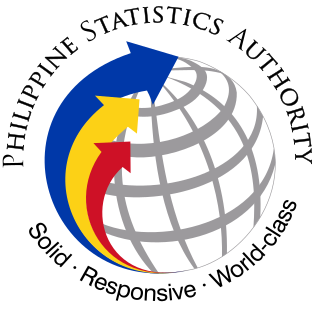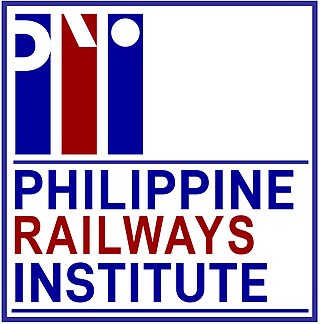
The economy of the Philippines is an emerging market, and considered as a newly industrialized country in the Asia-Pacific region. In 2024, the Philippine economy is estimated to be at ₱26.55 trillion, making it the world's 32nd largest by nominal GDP and 13th largest in Asia according to the International Monetary Fund.

Metropolitan Manila, commonly shortened to Metro Manila and formally the National Capital Region, is the capital region and largest metropolitan area of the Philippines. Located on the eastern shore of Manila Bay, the region lies between the Central Luzon and Calabarzon regions. Encompassing an area of 636.00 km2 (245.56 sq mi) and with a population of 13,484,462 as of 2020, it consists of sixteen highly urbanized cities: the capital city, Manila, Caloocan, Las Piñas, Makati, Malabon, Mandaluyong, Marikina, Muntinlupa, Navotas, Parañaque, Pasay, Pasig, Quezon City, San Juan, Taguig, and Valenzuela, along with one independent municipality, Pateros. As the second most populous and the most densely populated region in the Philippines, it ranks as the 9th most populous metropolitan area in Asia and the 6th most populous urban area in the world.
Japan External Trade Organization is an Independent Administrative Institution established by Japan Export Trade Research Organization as a nonprofit corporation in Osaka in February 1952, reorganized under the Ministry of International Trade and Industry (MITI) in 1958, and became an Independent Administrative Institution in 2003 to consolidate Japan's efforts in export promotion. The government has provided more than half of JETRO's annual operating budget. As of January 2020, JETRO maintained seventy-four offices in fifty-four countries, as well as forty-eight regional offices in Japan, with a total staff of 1,730. Its main office is located in the Ark Mori Building in Akasaka, Tokyo. Initially, JETRO's activities focused mainly on promoting exports to other countries. As exporters established themselves in world markets and the balance of trade turned from deficit to surplus, however, JETRO's role shifted to encompass more varied activities. These have included the furtherance of mutual understanding with trading partners, strategic investment attraction, import promotion, liaison between small businesses in Japan and their overseas counterparts, and data dissemination. Import promotion services have included publications, promotion of trade fairs, seminars, and trade missions.
The Australian Trade and Investment Commission, or Austrade, is the Australian Government's trade, investment and education promotion agency which was also given responsibility for tourism policy, programs and research from 2013. Austrade was established under the Australian Trade Commission Act 1985. It is a non-corporate Commonwealth entity under the Public Governance, Performance and Accountability Act 2013, and a statutory agency under the Public Service Act 1999. Austrade is part of the Foreign Affairs and Trade portfolio.

The Philippine Statistics Authority is the central statistical authority of the Philippine government that collects, compiles, analyzes, and publishes statistical information on economic, social, demographic, political affairs, and general affairs of the people of the Philippines, as well as enforcing the civil registration functions in the country.

The Technological University of the Philippines, commonly known as TUP, is a coeducational state university in the Philippines. It was established in 1901 by the Philippine Commission. TUP has its main campus in Manila and satellite campuses in Taguig, Cavite, Visayas, Batangas, and Quezon.

The Department of Trade and Industry is the executive department of the Philippine government responsible for the advancement, promotion, governance, regulation, management and growth of industry and trade.

Philippine Rice Research Institute (PhilRice) is a government corporate entity attached to the Department of Agriculture created through Executive Order 1061 on November 5, 1985 to help develop high-yielding and cost-reducing technologies for farmers.
The Center for the Promotion of Imports from developing countries, an agency of the Ministry of Foreign Affairs of the Netherlands, was established in 1971. CBI is an Agency of the Netherlands Ministry of Foreign Affairs and part of the development cooperation effort of the foreign relations of the Netherlands.

The Philippine Fiber Industry Development Authority or PhilFIDA is an agency of the Philippine Department of Agriculture responsible for promoting the accelerated growth and development of the fiber industry in the Philippines, such as abaca, also known as Manila hemp and cotton.

The Technical Education and Skills Development Authority serves as the Philippines' Technical Vocational Education and Training (TVET) authority. As a government agency, TESDA is tasked to both manage and supervise the Philippines' Technical Education and Skills Development Authority(TESDA). Its goals are to develop the Filipino workforce with "world-class competence and positive work values" and to provide quality technical-educational and skills development through its direction, policies, and programs.

Philippines–Russia relations are the bilateral relations between Russia and the Philippines. Both countries are full members of APEC.

The University of Southern Mindanao, formerly Mindanao Institute of Technology (MIT), is a university in the Southern Philippines. It provides instruction and professional training in the fields of science and technology, particularly agriculture and industry. The university was founded by Bai Hadja Fatima Matabay Plang, an educator and philanthropist. It formally open on October 1, 1954, and achieved university status on March 13, 1978. Its 1,024 hectare main campus is located in Kabacan, Cotabato. The University of Southern Mindanao is one of the four State University and Colleges (SUC) to achieve excellence in agricultural education and one of the nine to hold Level IV status. Across its 3 campuses USM holds a total of 5,129.97 hectares of land, mostly for agricultural teaching and research.

Anna Marie Periquet is a Filipino-born entrepreneur advocate, businesswoman, socio civic leader, talk show host, 5-dance Latin dancesport athlete and champion, public servant, and a former member of the House of Representatives.

The space program of the Philippines is currently maintained by the Philippine Space Agency (PhilSA) together with various agencies under the Department of Science and Technology (DOST). The space program includes space research and development, and is funded through the National SPACE Development Program (NSDP) by the DOST and received an initial budget of ₱1 billion in 2020.

The Philippine Space Agency (PhilSA) is the national space agency of the Philippines.

New Clark City is a planned community currently undergoing development, owned and managed by the Bases Conversion and Development Authority (BCDA). It is located within the Clark Freeport and Special Economic Zone in the municipalities of Bamban and Capas in Tarlac, Philippines. It covers an area of approximately 9,450 hectares and is designed to accommodate up to 1.2 million people.

The Philippine Railways Institute (PRI) is a rail transportation research and training center in the Philippines. It deals with research and development on the management, operation, and maintenance of railways, and training of personnel in the rail transportation industry.

Tutuban Center is a shopping complex and public transit hub in Manila, Philippines that opened in 1993. It encompasses five retail buildings and a parking building in and around Manila's central train station located in the shopping precinct of Divisoria in Tondo district. The 20-hectare (49-acre) mixed-use development includes the original two-story brick and iron main terminal building of the Ferrocaril de Manila-Dagupan built in 1887, a declared national historical building by the National Historical Commission of the Philippines since 1934. It also includes the Bonifacio Plaza fronting the old terminal building on Recto Avenue where a statue of Andrés Bonifacio was erected in 1971. Its integrated mall complex houses a mix of wholesale and retail bazaars and covers only 8.5 hectares of the total 20-hectare development. The complex will house the interchange station between the proposed North–South Commuter Railway and an extension of the Manila Light Rail Transit System Line 2 according to the masterplan submitted by the Japan International Cooperation Agency in 2015. Its redevelopment plan also entails the construction of several mixed-use buildings, including office towers, residential buildings, hotels, a convention center, and a 300-metre (980 ft)-high observation tower to be known as the Tower of Maynila.
















